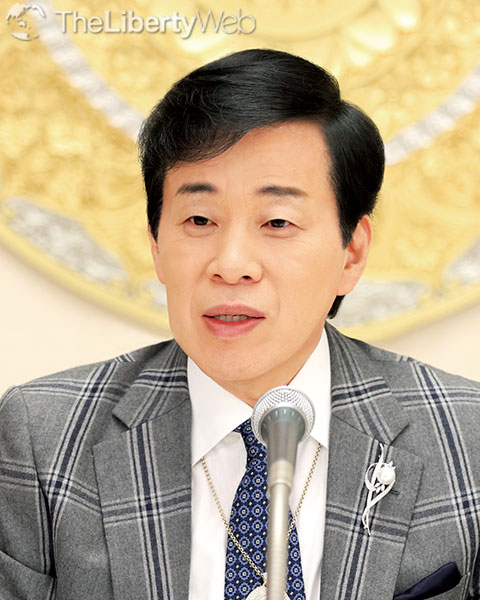A Manager’s Viewpoint for Getting Talent Promotion on Track (Part 1)
World Teacher’s Message No.314
Photo:PIXTA
There are some cases where a young person takes a supervisory position among older, more experienced people, and has to guide older employees. I would appreciate some advice on such cases.
January 5, 2012, Happy Science Special Lecture Hall
From the Q&A session of the lecture “Management in Crisis”

It’s a difficult topic. When people talk about “promoting young people,” there are many companies that try to follow the trend. However, after a company promotes a young person, often times he will be left all alone, and before you know it, he is in a situation where he has been “raised to the second floor and the ladder has been removed.” The number of such promoted young people become isolated, helpless and end up ruining their chances.
This is because there is no such culture rooted in that company. In a place where the promotion culture is well established, everyone knows how to do it, but if you just promote someone without knowing how to do it and leave him alone, there are many cases where the person “dies in battle.”
Many managers are not aware of this problem. They think, “I promoted him, so he will do great.” However, I think there is still a need for follow-up. Those in higher positions have to follow up to make it work.
Japan Should Improve Its Skills to Evaluate Abilities One Step Further
The United States, as an advanced country, has already experienced a lot in this area.
The United States is more education-oriented than Japan, and it is a country that highly values people who have the ability to make money, so I think that in terms of evaluating one’s abilities, it is far more advanced than Japan.
Some people who just received an MBA will not be satisfied unless they are given a vice president position immediately, and in fact, some companies do give them such positions. Japanese people will put up with -not being given the vice president position-, but people in America will not be, so if they don’t get a position, they won’t work and they’ll move on to other jobs.
Also, the United States highly values people who have achieved success in business. Success in another company has a huge impact on the evaluation of your position when you go to the next company. In Japan, the emphasis is on “pure blood”, so the evaluation (creating success in another company) has a lower impact. I think Japan needs to improve its skills in evaluating abilities one step further.
However, even in America, I learned that the bosses are not comfortable firing people or transfering people around. In the movie “Up in the Air”, there is a scene where the boss says, “I don’t want to fire people”, and the company hires and dispatches a professional to fire people. It occurred to me that Americans are also scared to fire people and they would be afraid to walk at night. It’s a big deal for everyone to throw one’s family suddenly out on the street. While such feelings of humanity are necessary, we must also create a system for evaluating abilities and supporting them.
Also, it is necessary to try to look at various abilities from different angles. It is not sufficient to evaluate only one ability. We need to be careful about promoting only people with specialized skills.
When a company is on the verge of collapse, they can’t figure out what’s going on, then they start promoting people randomly to turn the table, without judging comprehensively. This is when you need to be careful.
Also, there are some jobs that cannot be done without a certain amount of experience. Even when you promote someone, it will be difficult for him to absorb the skills after promotion.

Without Creating a Job Rotation System, People Will Not Be Useful in Other Places
Another thing we need to be careful about is the “salted type”. There are many companies that keep people in one section for a long time. Although it is reassuring to think that if you keep them there for a long time, they will become veterans, but in a sense, they cannot advance their careers.
Many of the banks were like that in the past, where women were not transferred and stayed in the same section for twenty years, so they knew everything. Men were rotated every three years or so, so they were like newbies tagging along with their bosses.
Without creating a job rotation system, even if you promote someone, it may lead to a tragedy because that person may perform well only in one place but not the other place. It requires effort from the person who is promoted so he can perform at the same level wherever he is transferred.
Generally speaking, the success rate of promotion in Japan is 40%, and 60% tend to die in battle. You need to take this risk into account.
That being said, even if 60% die in the battle, the successful 40% of those promoted still perform quite well, so you shouldn’t be intimidated. In most cases, the reason it doesn’t work out is because there is not enough support from higher ups, and the relationship building with colleagues is not done well.
This is a systematic problem, so the question is how to create a culture in the system.
In the end, the company is building a big ship. If everyone is convinced that the ship is growing and can keep moving forward without sinking, they will accept the company policy. Getting continuous good results will be a proof and the raw material for compliance.
However, there are many cases where people with strong ability end up quitting while they were kept on hold until they get older, or such people have been “killed” or “crushed” without being promoted in the company. The managers need to pay keen attention in this area.

Photo:PIXTA
Do Not Focus Only on Elites and Think About Ways to Increase the Overall Fighting Power
Another thing that is easily misunderstood, especially in Japanese companies, is that the company first selects only the top elites from the time of joining the company and puts them on a special course; they separate the courses from beginning for special elites, soldiers and normal employees. But you can’t tell everything about a person in a 30-minute interview or with the entrance exam scores. I think they need more flexibility.
As Drucker said, in America, the path of an employee is set right from the beginning at the hiring stage, whereas in Japan, he praised, a person who started out as a factory worker can become presidents even in large manufacturing companies. So-called blue-collar workers can become president. There was a person who start out as a dishwasher at hotels and later on became hotel president, and Mr. Drucker said this is what he thinks Japan is great. A sense of equality remains partially in Japan. Please remind that there are always opportunities and also, the work cannot be done by elites alone.
There is the 80/20 rule: if you gather 100 ants, 20 will be hard workers and 80 will be lazy. It is said that if you divide that number in half, the same thing will happen again. If you take 20 hard working ants, 20% of them will work hard and 80% will be lazy, and this happens again and again. Also, if you double that number, the ants that were hard working before become lazy. It is said that the same phenomena happen inevitably.
Since the work cannot be done only by the elites, you need to get the middle-class, or the average person to do more than average work. You also need to make an effort to get the lower than average person to do more than what he gets paid. I think that the managers who do not think about raising the bottom line in this sense are missing something important.
There are people who can achieve good results even after promotion, but then some people around them may lose motivation and become depressed. So balancing and foreseeing what will happen overall is crucial.
Usually, when a company or an organization promotes a young person to a higher position, it is often a sign of a major restructuring is coming, so everyone prepares for it. When you realize that there is no major restructuring after all, you will feel a sense of relief. Then it is time for you to really focus on how to improve your current ability so you can open up a path for yourself in the future.



















